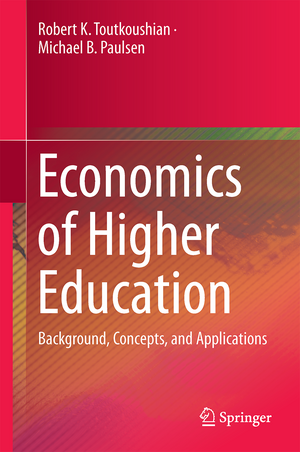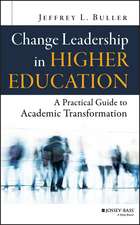Economics of Higher Education: Background, Concepts, and Applications
Autor Robert K. Toutkoushian, Michael B. Paulsenen Limba Engleză Hardback – 29 mar 2016
William E. Becker, Jr., Professor Emeritus of Economics, Indiana University
| Toate formatele și edițiile | Preț | Express |
|---|---|---|
| Paperback (1) | 1414.09 lei 43-57 zile | |
| SPRINGER NETHERLANDS – 25 apr 2018 | 1414.09 lei 43-57 zile | |
| Hardback (1) | 1227.36 lei 43-57 zile | |
| SPRINGER NETHERLANDS – 29 mar 2016 | 1227.36 lei 43-57 zile |
Preț: 1227.36 lei
Preț vechi: 1496.78 lei
-18% Nou
234.85€ • 245.86$ • 194.33£
Carte tipărită la comandă
Livrare economică 07-21 aprilie
Specificații
ISBN-10: 9401775044
Pagini: 388
Ilustrații: XI, 390 p. 70 illus., 53 illus. in color.
Dimensiuni: 155 x 235 x 24 mm
Greutate: 0.72 kg
Ediția:1st ed. 2016
Editura: SPRINGER NETHERLANDS
Colecția Springer
Locul publicării:Dordrecht, Netherlands
Public țintă
ResearchCuprins
Introduction.- 1. Overview of Economic Reasoning and Terminology.- 2. Student Investment in Higher Education.- 3. Private and Social Returns to Higher Education.- 4. Demand and Supply in Higher Education.- 5. The Role of Government in Higher Education.- 6. Higher Education Revenues and Expenditures.- 7. Competition and Production in Higher Education.- 8. Labor Economics and Higher Education.- 9. Current and Emerging Research on Economics of Higher Education.
Recenzii
Notă biografică
PhD in higher education and economics from The University of Iowa and an MA in economics from the University of Wisconsin (Milwaukee), where he specialized in labor economics, public sector economics, and economics of education. Prior to his faculty appointment at The University of Iowa, he was a professor of higher education at the Universities of Illinois, Alabama, and New Orleans; and a professor of economics at St. Ambrose University. In addition to his faculty appointment, Dr. Paulsen serves as the Series Editor of the scholarly book series Higher Education: Handbook of Theory and Research; a consulting editor for Research in Higher Education and the ASHE Higher Education Reports. He has over sixty publications—books, journal articles, book chapters—including his book The Finance of Higher Education. His publications in economics of higher education have focused on college choice, tuition inflation, effects of prices/subsidies on student persistence, higher education costs, growth in workforce productivity, demand for higher education, and effects of financial conditions on curricular change.
Textul de pe ultima copertă
This book examines the many ways in which economic concepts, theories and models can be used to examine issues in higher education. The topics explored in the book include how students make college-going decisions, the payoffs to students and society from going to college, markets for higher education services, demand and supply in markets for higher education, why and how state and federal governments intervene in higher education markets, college and university revenues and expenditures, how institutions use net-pricing strategies and non-price product-differentiation strategies to pursue their goals and to compete in higher education markets, as well as issues related to faculty labor markets. The book is written for both economists and non-economists who study higher education issues and provides readers with background information and thorough explanations and illustrations of key economic concepts. In addition to reviewing the contributions economists have made to the study of higher education, it also examines recent research in each of the major topical areas. The book is policy-focused and each chapter analyses how contemporary higher education policies affect the behaviour of students, faculty and/or institutions of higher education. "Toutkoushian and Paulsen attempted a daunting task: to write a book on the economics of higher education for non-economists that is also useful to economists. A book that could be used for reference and as a textbook for higher education classes in economics, finance, and policy. They accomplish this tough balancing act with stunning success in a large volume that will serve as the go-to place for anyone interested in the history and current thinking on the economics of higher education."
William E. Becker, Jr., Professor Emeritus of Economics, Indiana University
Caracteristici
Provides background and explanations of key economic concepts for non-economists
Focuses exclusively on the field of higher education
Analyses how higher education policies affect the behaviour of students, faculty and institutions
Reviews the contributions economists have made to the study of higher education
Descriere
This book examines the many ways in which economic concepts, theories and models can be used to examine issues in higher education. The topics explored in the book include how students make college-going decisions, the payoffs to students and society from going to college, markets for higher education services, demand and supply in markets for higher education, why and how state and federal governments intervene in higher education markets, college and university revenues and expenditures, how institutions use net-pricing strategies and non-price product-differentiation strategies to pursue their goals and to compete in higher education markets, as well as issues related to faculty labor markets. The book is written for both economists and non-economists who study higher education issues and provides readers with background information and thorough explanations and illustrations of key economic concepts. In addition to reviewing the contributions economists have made to the study of higher education, it also examines recent research in each of the major topical areas. The book is policy-focused and each chapter analyses how contemporary higher education policies affect the behaviour of students, faculty and/or institutions of higher education. "Toutkoushian and Paulsen attempted a daunting task: to write a book on the economics of higher education for non-economists that is also useful to economists. A book that could be used for reference and as a textbook for higher education classes in economics, finance, and policy. They accomplish this tough balancing act with stunning success in a large volume that will serve as the go-to place for anyone interested in the history and current thinking on the economics of higher education.”
William E. Becker, Jr., Professor Emeritus of Economics, Indiana University












